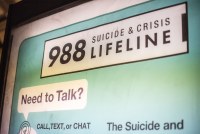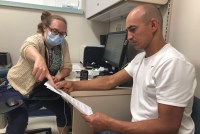Latest KFF Health News Stories
Most States Have Yet to Permanently Fund 988. Call Centers Want Certainty.
For rural Americans, who live in areas often short of mental health services and die by suicide at a far higher rate than urbanites, the federally mandated crisis phone line is one of the few options to connect with a crisis counselor.
‘Like a Russian Roulette’: US Military Firefighters Grapple With Unknowns of PFAS Exposure
Federal research linking “forever chemicals” to testicular cancer confirms what U.S. military personnel long suspected. But as they seek testing for PFAS exposure, many wonder what to do with the results. There’s no medical treatment yet.
Hollywood’s A-List Health Insurance Is Jeopardized by the Labor Strikes
Hollywood actors and writers who qualify for their union health plans get a very good deal compared with other Americans. But not working during the strike threatens their eligibility in the system.
Even in the Most Depressed County in America, Stigma Around Mental Illness Persists
An estimated 32% of adults in Logan County, West Virginia, have been diagnosed with depression, the highest rate in the United States, according to a recent CDC report.
Cozy Images of Plush Toys and Blankets Counter Messaging on Safe Infant Sleep
Unsafe sleep environments are among the main reasons accidental suffocation or strangulation is a hard-to-solve public health problem.
Mississippi’s Cervical Cancer Deaths Indicate Broader Health Care Problems
Mississippi has among the highest cervical cancer mortality rates in the U.S. When low-income women can’t afford regular preventive care, much less gynecological visits, this highly preventable and treatable cancer becomes a killer.
Workers Pay the Price While Congress and Employers Debate Need for Heat Regulations
Studies suggest official numbers vastly underestimate heat-related injuries and illness on the job. To institute protections, the government must calculate their cost — and the cost of inaction.
When Temps Rise, So Do Medical Risks. Should Doctors and Nurses Talk More About Heat?
The medical dangers of heat are real. But people often ignore public heat alerts or don’t realize how vulnerable they are. A new alert system prompts clinicians to talk about heat with patients.
How Far Will Montana’s Push to Remove Lead from School Drinking Water Go?
Montana has earmarked $3.7 million to address widespread high levels of lead in school drinking water. But it likely isn’t enough to solve the problem.
A Move to Cut Drug Prices Has Patients With Rare Diseases Worried
A Colorado board has named five drugs it will review for affordability and potential cost caps. But patients with cystic fibrosis worry they will lose access to a life-changing therapy.
She Paid Her Husband’s Hospital Bill. A Year After His Death, They Wanted More Money.
A widow encountered a perplexing reality in medical billing: Providers can come after patients to collect well after a bill has been paid.
Californians Headed to HBCUs in the South Prepare for College Under Abortion Bans
As high school graduates prepare to leave states like California that protect abortion rights for historically Black colleges in states where abortion is banned, they’re getting ready to safeguard their reproductive health during college.
A Nanoengineer Teamed Up With Rihanna’s Tattoo Artist to Make Smarter Ink
Tattoos are more popular than ever. About a third of Americans have at least one. A scientist-entrepreneur, together with a celebrity tattoo artist, believes that ink could be doing a lot more.
More Cities Address ‘Shade Deserts’ as Extreme Heat Triggers Health Issues
Where trees are growing — and who has access to their shade — affects health and well-being, especially in one of the hottest states in the country.
Journalists Track Hospitals’ Delivery of Charity Care and the Menace of ‘Forever Chemicals’
KFF Health News and California Healthline staff made the rounds on national and local media this week to discuss their stories. Here’s a collection of their appearances.
California Offers Lifeline to 17 Troubled Hospitals
California’s new lending program for distressed hospitals will provide Madera Community Hospital with interest-free loans of up to $52 million if it can agree on a viable reopening plan with Adventist Health. The state will offer an additional $240.5 million in interest-free loans to 16 other troubled hospitals.
Republican Debate Highlights Candidates’ Views on Abortion
Though health policies in general got little airtime, the discussion of whether candidates support a federal abortion ban underscored how Republicans, in a post-Roe environment, face political challenges on the issue.
What the Health? From KFF Health News: A Not-So-Health-y GOP Debate
The first Republican presidential debate of the 2024 cycle took place without front-runner Donald Trump — and with hardly a mention of health issues save for abortion. Meanwhile, in Florida, patients dropped from the Medicaid program are suing the state for not giving them enough notice or a way to contest their being dropped from the program. Margot Sanger-Katz of The New York Times, Joanne Kenen of the Johns Hopkins Bloomberg School of Public Health and Politico, and Victoria Knight of Axios join KFF Health News’ Julie Rovner to discuss these issues and more. Plus, for “extra credit,” the panelists suggest health policy stories they read this week they think you should read, too.
Dangers and Deaths Around Black Pregnancies Seen as a ‘Completely Preventable’ Health Crisis
Studies show that high rates of Black fetal and infant deaths are largely preventable — and part of systemic failures that contribute to disproportionately high Black maternal mortality rates.
Naming Suicide in Obits Was Once Taboo. Changing That Can Help Loved Ones Grieve.
Mental health is being talked about more openly than ever, but the word “suicide” has remained largely taboo when describing how someone died. See why that’s slowly changing, what it means for people who grieve those deaths, and how candor can help prevent additional suicides.


























